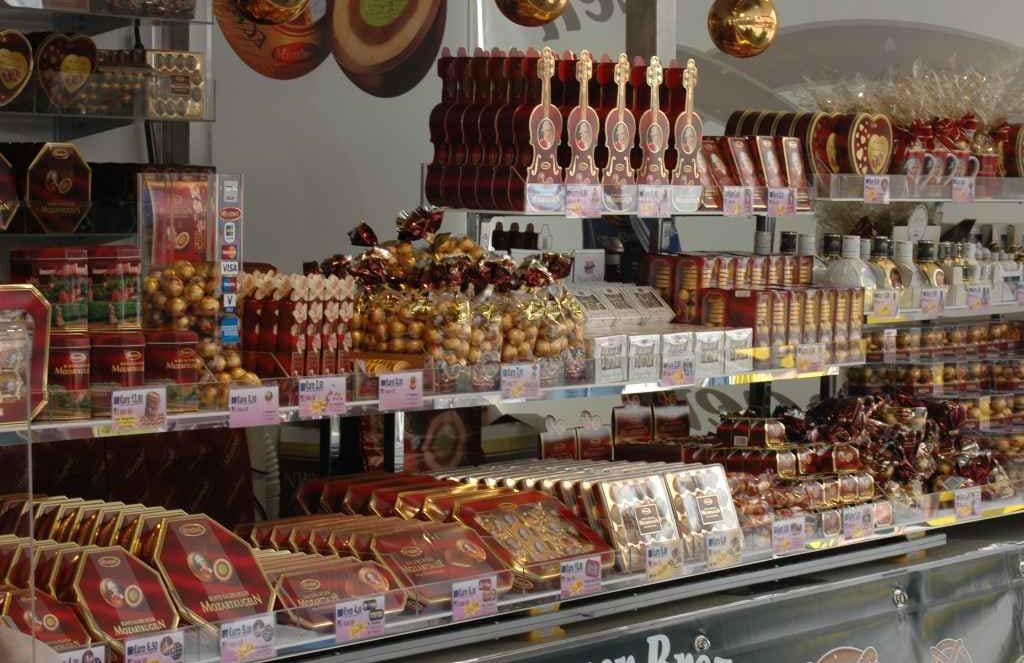Thessaloniki gets ready for its metro launch in November
The underground rapid transit lines have been under construction for almost two decades due to various project delays
 TheMayor.EU logo
TheMayor.EU logo 
A shop in Salzburg, selling a wide variety of Mozartkugel products , Source: Gert Vincent on Wikipedia, CC BY 3.0
The Salzburg Schokolade company filed for bankruptcy, putting the iconic Mirabell Mozartkugel on the endangered list
On Monday, in a surprise turn of events, the manufacturer of the iconic Austrian Mozartkugel chocolates filed for bankruptcy. Salzburg Schokolade did not give out any hints that it was under financial strain and yesterday’s announcement caught the public off guard. The biggest surprise, though, came for the nearly 140 employees in the company’s chocolate factory in Grödig, a small town on the edge of Salzburg.
The news broke as the company cited that it cannot afford to pay the workers’ November salary. Luckily, despite the sudden development, local authorities have vowed to cover lost employee wages, as officials pledge to not leave anyone behind over the Christmas months.
Apart from lost wages, though, the bankruptcy is a blow to Salzburg’s business profile, considering the city has a monument to the Mozartkugel. After all, the Mozartkugel chocolates are a staple of Austria and Salzburg. With this development, eyes are fixed on the future of the brand legacy, and whether there will be a Mozartkugel at the end of 2021.
A court-appointed insolvency administrator will decide the best course of action from here on.
On the part of the company, their subsidiary located in the Czech Republic would not be affected by the bankruptcy and will continue to operate normally. According to a report from the ORF, Austria’s national news network, workers in Salzburg will now work with the leftover raw materials with no expectation of additional supplies.
Chocolates, skiing and classical music are practically synonymous with Salzburg and the bankruptcy of Salzburg Schokolade will change the city, without a doubt. Originally, the company was established in the 19th century. The real game-changer, though, came in 1948 during Austria’s so-called economic miracle after World War II.
In 1948, the company created the ‘Mirabell Mozartkugel’ sweet treat and moved production to Grödig. At the same time, sales took off and their range of products became world-famous. Seven years ago, the company was taken over by a group of investors, aiming for increased growth. Considering recent developments, things seem to not have gone as planned.

The underground rapid transit lines have been under construction for almost two decades due to various project delays

Now you can get your wine in Talence by paying directly in Bitcoin

That’s because the state has to spend money on updating the railway infrastructure rather than subsidizing the cost of the popular pass

Rethinking renewable energy sources for the urban landscape

The examples, compiled by Beyond Fossil Fuels, can inform and inspire communities and entrepreneurs that still feel trepidation at the prospect of energy transition

Now you can get your wine in Talence by paying directly in Bitcoin

The 10th European Conference on Sustainable Cities and Towns (ESCT) sets the stage for stronger cooperation between the EU, national and local level to fast track Europe's transition to climate neutrality.

At least, that’s the promise made by the mayor of Paris, Anne Hidalgo

The underground rapid transit lines have been under construction for almost two decades due to various project delays

At least, that’s the promise made by the mayor of Paris, Anne Hidalgo

Hostal de Pinós is located in the geographical centre of the autonomous region

Despite its church-y name, the district has long been known as the hangout spot for the artsy crowds

Urban dwellers across the EU are having a say in making their surroundings friendlier to people and the environment.

Forests in the EU can help green the European construction industry and bolster a continent-wide push for architectural improvements.

Apply by 10 November and do your part for the transformation of European public spaces

An interview with the Mayor of a Polish city that seeks to reinvent itself

An interview with the newly elected ICLEI President and Mayor of Malmö

A conversation with the Mayor of Lisbon about the spirit and dimensions of innovation present in the Portuguese capital














